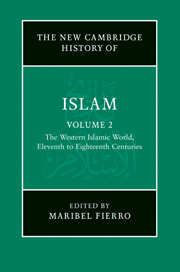Book contents
- Frontmatter
- Introduction
- PART I AL-ANDALUS AND NORTH AND WEST AFRICA (ELEVENTH TO FIFTEENTH CENTURIES)
- PART II EGYPT AND SYRIA (ELEVENTH CENTURY UNTIL THE OTTOMAN CONQUEST)
- PART III MUSLIM ANATOLIA AND THE OTTOMAN EMPIRE
- PART IV NORTH AND WEST AFRICA (SIXTEENTH TO EIGHTEENTH CENTURIES)
- PART V RULERS, SOLDIERS, PEASANTS, SCHOLARS AND TRADERS
- 19 State formation and organisation
- 20 Conversion to Islam: from the ‘age of conversions’ to the millet system
- 21 Taxation and armies
- 22 Trade
- 23 The ʿulamāʾ
- Glossary
- Bibliography
- Index
- References
23 - The ʿulamāʾ
from PART V - RULERS, SOLDIERS, PEASANTS, SCHOLARS AND TRADERS
Published online by Cambridge University Press: 28 March 2011
- Frontmatter
- Introduction
- PART I AL-ANDALUS AND NORTH AND WEST AFRICA (ELEVENTH TO FIFTEENTH CENTURIES)
- PART II EGYPT AND SYRIA (ELEVENTH CENTURY UNTIL THE OTTOMAN CONQUEST)
- PART III MUSLIM ANATOLIA AND THE OTTOMAN EMPIRE
- PART IV NORTH AND WEST AFRICA (SIXTEENTH TO EIGHTEENTH CENTURIES)
- PART V RULERS, SOLDIERS, PEASANTS, SCHOLARS AND TRADERS
- 19 State formation and organisation
- 20 Conversion to Islam: from the ‘age of conversions’ to the millet system
- 21 Taxation and armies
- 22 Trade
- 23 The ʿulamāʾ
- Glossary
- Bibliography
- Index
- References
Summary
Introduction
Scholars (ʿulamāʾ, sing. ʿālim) constitute the most fully documented social group of pre-modern Islamic societies. Information is so abundant that in some cases we can track specific families across considerable geographical and chronological distances and carry out quantitative sociological analyses. This wealth of information comes to us directly from the ʿulamāʾ themselves, as they were careful to leave detailed written records of their names, activities and professional accomplishments in the form of thousands upon thousands of biographical entries compiled in what are known as ‘biographical dictionaries’.
The image that the ʿulamāʾ convey of themselves is one of individuals fully dedicated to the study and dissemination of knowledge (ʿilm). The ʿulamāʾ preserved and spread the revealed Word, the deeds and sayings of the Prophet Muḥammad and the legal system which gave form to their society. As the individuals who shaped and interpreted this knowledge, the ʿulamāʾ regarded themselves as ‘heirs of the prophets’. Their social practices were calculated to preserve and pass on their rank, just as the ʿulamāʾ preserved and transmitted their knowledge, from one generation to the next. Thus, biographical dictionaries have been regarded by some modern scholars as the Islamic counterpart of the official archives that we find for the medieval Christian West.
- Type
- Chapter
- Information
- The New Cambridge History of Islam , pp. 679 - 704Publisher: Cambridge University PressPrint publication year: 2010
References
- 1
- Cited by

